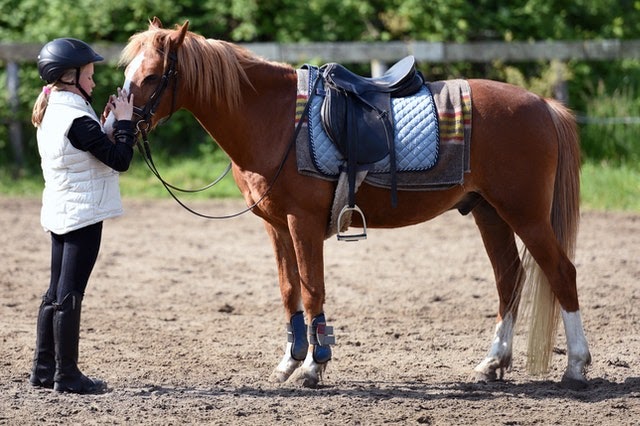How To Prepare For Your First Riding Lesson
Horse riding is a popular sport for both children and adults alike, and you’re never too old to get in the saddle for the first time. Booking your first riding lesson can be daunting, especially when everyone seems to have all the gear and to have been riding since before they can walk – but don’t worry, every rider has to start somewhere. Here are a few tips to help you prepare for the big day.
Stop worrying about your fitness.
Riding is a surprisingly good workout, but don’t worry, you don’t need to be fit to get started. If you’re anxious about your fitness, have not exercised in some time, or have a medical condition, then it’s often best to check with your GP first to make sure that they approve of you riding for exercise.
During your first riding lesson, you will likely spend a lot of time walking, which involves your core muscles the most. If you progress to trot, then your quads will also get a bit of a workout, not to mention your arms from holding the correct rein position.
After your first lesson, it is normal to feel some aches and pains in muscles that you have not used for some time, but these will soon go away, and as you ride more, your fitness will improve. If you want to do something to help improve your riding fitness, then swimming, pilates and yoga are all great exercises to try.
You don’t need expensive gear right away.
Generally speaking, you can turn up to most riding schools with no riding gear at all, and still enjoy your first lesson. The vast majority of riding centres will provide you with a helmet, and you don’t need to worry about wearing special riding clothes, so long as what you are wearing is comfortable and allows you freedom of movement. Try to avoid jeans if you can, as their seams can rub your legs, and if possible, wear boots with a slight heel rather than trainers. If you enjoy your first lesson and decide to start riding more regularly, then you may want to consider buying your own helmet, jodhpurs, and riding boots from Equi Supermarket. Although they’re not compulsory, riding gloves are also handy for reducing friction on your skin and keeping your hands warm during colder weather.
What to expect from your first riding lesson
If you’ve never ridden a horse before, then don’t panic, your first riding lesson will be on a lead rope (meaning that someone will be at the head of your horse or pony) and will likely involve mostly walking, with a perhaps a little trot. As you start to get a feel for the correct riding position and how to control your horse, then you may progress to a lunge line (essentially a longer lead rope) which allows your instructor to help your progression better.
Throughout your riding lesson, don’t be afraid to ask questions – whatever they may be or how stupid you may think they are! Asking questions shows that you are genuinely interested in learning how to ride and will likely help you to progress more quickly.
Every person’s first riding lesson is slightly different depending on their experience level and how quickly they pick up the fundamentals of riding. Don’t base your journey against anyone else – learn at your own pace.
Will you get to spend extra time with your horse?
Let’s face it, most of us start riding because we also love horses, and it’s nice to get to spend some time with your riding partner before or after a lesson to give them some much deserved TLC. If you want to get involved grooming and tacking up your horse, then arrive a little early to your lesson and let the staff know – more often than not, they’d be glad of the extra pair of hands. Depending on your schedule and that of your horse, you may also get to spend some time with them after – and a cheeky carrot after a lesson always goes down well.
What happens if I fall off?
It is extremely unlikely that you will fall during your first riding lesson because you will be on a lead rope and will also have been assigned a horse or pony that is used to working with a beginner. As you progress and start trying different gaits and jumping, then, of course, your likelihood of falling does increase slightly. Try not to worry about falling, but if you are concerned, then consider investing in a body protector which will give you some extra security.
So there you have it – do you feel a little more relaxed about your first lesson now? You’re going to have a great time no matter your skill level.

